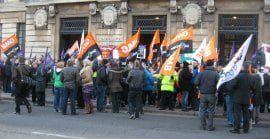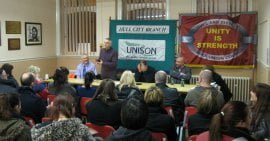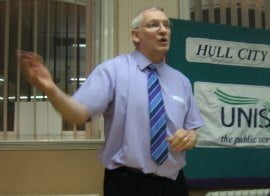On Thursday 28th February 2013, three Labour councillors in Hull stood up in front of a packed and cheering public gallery at the Guildhall and laid out why they were going to defy the Labour whip and vote against the Coalition’s cuts, proposed by the controlling Labour Group. Such defiance marks an important turning point in the fight against austerity and should act as a rallying call for the trade unions and other Labour councillors across the country.
On Thursday 28th February 2013, Gary Wareing, a Labour councillor and member of ASLEF, stood up in front of a packed and cheering public gallery at the Guildhall in Hull and laid out why he was going to defy the Labour whip and vote against the Coalition’s cuts, proposed by the controlling Labour Group.
Gary laid the blame for the severe austerity measures now facing the people of Hull – amounting to some £100 million pounds over the next 3 years – firmly at the foot of the bankers and their backers in the Tory-led coalition. Gary’s speech was followed by two other Labour councillors, Dean Kirk and Gill Kennet. Gill finished her speech by quoting George Lansbury, who led the Poplar Rates Revolt, which defied government, the courts, and the Labour Party leadership in 1921: “You are not judged by what you say but what you do.”
 Rally outside the Guildhall in HullDespite the warning from other Labour councillors from the floor that by not setting a balanced budget the council the Labour council would risk Eric Pickles marching in to the Town Hall with a team of administrators to take over the running of the council, the three councillors stood firm and voted against the cuts. With their heads held high they joined the cheering rally – brilliantly organised by Hull Unison – waiting outside the Guildhall to greet them.
Rally outside the Guildhall in HullDespite the warning from other Labour councillors from the floor that by not setting a balanced budget the council the Labour council would risk Eric Pickles marching in to the Town Hall with a team of administrators to take over the running of the council, the three councillors stood firm and voted against the cuts. With their heads held high they joined the cheering rally – brilliantly organised by Hull Unison – waiting outside the Guildhall to greet them.
Speaker after speaker at the rally hailed the decision of the three councillors in standing up for the principles of Lansbury and the Poplar revolt as a historic landmark. Such a stand could encourage other Labour councillors across the length and breadth of the country who are wrestling with their conscience to defy the cuts and to hell with the consequences.
Later at a packed meeting convened by the Labour Representation Committee, held in the Unison offices, the three councillors were given a standing ovation. The Hull councillors committed themselves, along with the public service unions, to be at the forefront of a public campaign to raise the issues of the austerity cuts with community groups and others affected by the cuts in Hull.
After a tremendous ovation for the three rebel councillors, councillor Gary Wareing kicked off an electric meeting. He described how the councillors have come under tremendous pressure – from the bureaucracy and from the establishment – to go along with these cuts, however unwillingly. However, Gary also explained that there is another pressure: the pressure of the movement and the pressure of history to refuse the cuts.
Councillor Dean Kirk was up next. He explained how he had promised the working people of his ward that, if elected as a Labour councillor, he would not implement cuts – and that he had meant what he said. Councillor Gill Kennet followed, describing how most of the councillors were decent people, but that now a line has to be drawn in the sand. Vulnerable people who Gill had worked with were now going to find themselves without any support.
The councillors have often been threatened with the prospect of Pickles coming up the motorway to dictatorially impose the cuts if the Labour council refused to do so. The argument is that this would be far worse than if the Labour council itself was to implement the cuts. However, as Gill said, it doesn’t matter whether the stick you’re being beaten with is a blue Tory stick or a red Labour stick! Gill summarised the stand that the councillors are making: as representatives of the labour movement the councillors stand on the shoulders of giants, and the benefits that our ancestors fought for are not ours to give away.
 John Dunn (standing) and the Hull councillors at a packed public meetingJohn Dunn, a former Clay Cross councillor, ex-miner, and supporter of Socialist Appeal, also spoke from the platform about his experiences in the Clay Cross rent strike of 1972, which defied the implementation the “Housing Finance Act”, designed to claw in a bit of extra money by increasing council tenants’ rents. John gave an account of how the Tory Government sent the Housing Commissioner into Clay Cross to “teach the local rebels a lesson” and collect unpaid rents. Such was the total non-cooperation of the working people of Clay Cross that the Commissioner not only left defeated without any money – he could not even get anyone to make him a cup of coffee when doing his dirty business in the council offices! “If that could happen in a small town like Clay Cross, just think what would happen to Eric Pickles in a town the size of Hull”, John stated to the unanimous approval of the meeting.
John Dunn (standing) and the Hull councillors at a packed public meetingJohn Dunn, a former Clay Cross councillor, ex-miner, and supporter of Socialist Appeal, also spoke from the platform about his experiences in the Clay Cross rent strike of 1972, which defied the implementation the “Housing Finance Act”, designed to claw in a bit of extra money by increasing council tenants’ rents. John gave an account of how the Tory Government sent the Housing Commissioner into Clay Cross to “teach the local rebels a lesson” and collect unpaid rents. Such was the total non-cooperation of the working people of Clay Cross that the Commissioner not only left defeated without any money – he could not even get anyone to make him a cup of coffee when doing his dirty business in the council offices! “If that could happen in a small town like Clay Cross, just think what would happen to Eric Pickles in a town the size of Hull”, John stated to the unanimous approval of the meeting.
John finished off his rousing speech by saying that a mass movement of resistance, led by the trade union and Labour leaders with pressure from below, could not only bring down the coalition government, but also point the way for an incoming Labour government to adopt a bold socialist programme as a means of creating a society in the interests of working people and not the capitalist class as at present. John summed up that what is needed is not Ed Miliband’s “responsible capitalism”; capitalism of course is responsible – it is responsible for war, for poverty, and for much else. What we need is a socialist Britain as part of a world socialist federation.
From the floor, Dave Platts, a Unite activist, reminded the meeting that the English Civil war started in Hull on 10th July 1642 when a Royalist raiding party approached the city to intimidate the defenders by burning down buildings outside the town walls. In the first military action of the English Civil War, the Royalists were driven away by gunfire from the defenders of Hull. Discouraged by the vigour of the Parliamentarian defence, King Charles abandoned the siege of Hull at the end of July and withdrew to York. The same would happen if the majority Labour councillors followed the example of Gary, Gill and Dean by defying the cuts and not carrying out austerity measures. Pickles and his Tory foot soldiers would get the same treatment as the Royalists.
The strong message coming across from the meeting was that the campaign against austerity and all it stands for should attempt to involve all working class people, in the same way as the Poll Tax in 1990, which involved hundreds of local communities across the working class areas of the UK in a mass show of unity and solidarity. Such a campaign, which would spark of a mass movement of resistance to the cuts, should be led by the trade union and Labour Party, with pressure and support from below. The leadership of the trade unions and the Labour Party – the traditional mass organisations of working people – is ultimately the best placed to lead such a campaign. This campaign must have at its heart not only a desire to bring down the Coalition, but also a message of necessity regarding the election of a Labour government that has the interests of working people at heart and is willing to fight for socialist policies.






